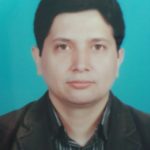Dr. Muhammad Mahtab Alam
AFFILIATION:
Tallinn University of Technology
INVITED TALK:
“Wearable Wireless Networks – From Theory to Practice”
TALK ABSTRACT:
Interconnected internet of humans (IoH) is a new paradigm in which wearable wireless networks (WWN) are emerging as a key enabling technology. WWN is revolutionizing health-care, sports and fitness, rescue and emergency management, augmented reality, fashion, and many other applications. Wearable wireless networks composed of various types of devices such as sensors, actuator, coordinators, and gateways etc., to realize on-body, body-to-body (B2B) and off-body wireless communication. However, often these devices are severely constrained due to ultra-low power consumption, miniaturization, low processing and storage capabilities as well as low delay requirements, consequently, the reliability and quality-of-service of above mentioned applications are very challenging. Consequently, all these factors make it difficult to choose an appropriate technology, which predominantly depends on a given application. In particular, the talk is emphasized on the impact of coarse-grain factors (such as dynamic and diverse mobility, radio-link and signal propagation, interference management, data dissemination schemes and routing approaches) that directly impact on the communication performance in WWN in real-life applications. It is observed that by considering the impact of above-mentioned factors, the general perception of using various technologies may not be correct.
BRIEF BIOGRAPHY:
Muhammad Mahtab Alam received his M.Sc. degree in Electrical Engineering (Applied Signal Processing and Implementation) from Aalborg University (AAU), Denmark, in 2007. From 2007 until 2009 he was working as research assistant in Center for Software Defined Radio (CSDR) at AAU, Denmark. He was working on European project “Global Energy Optimization for Distributed Embedded Systems” during his PhD from 2009 until 2013 at University of Rennes1 and INRIA research center. From Mar. 2013 until Dec. 2013 He was working as Assistant Professor in Swedish College of Engineering and Technology at Wah Cantt, Pakistan. He did his post doctorate research in Qatar Foundation funded project “Critical and Rescue Operations using Wearable Wireless Sensor Networks” at Qatar Mobility Innovations Center (Jan. 2014 to Aug. 2016). Currently, since Sept. 2016, he is working as European Research Area Chair on Cognitive Electronics and Associate Professor in the Thomas Johann Seebeck Department of Electronics at Tallinn University of Technology. His research interests are in fields of self-organized and self-adaptive wireless sensor and body area networks specific to energy efficient communication protocols and accurate energy modeling, Internet-of-things, public safety networks, embedded systems, digital signal processing and software defined radio. He is author and co-author of more than 30 research publications.
